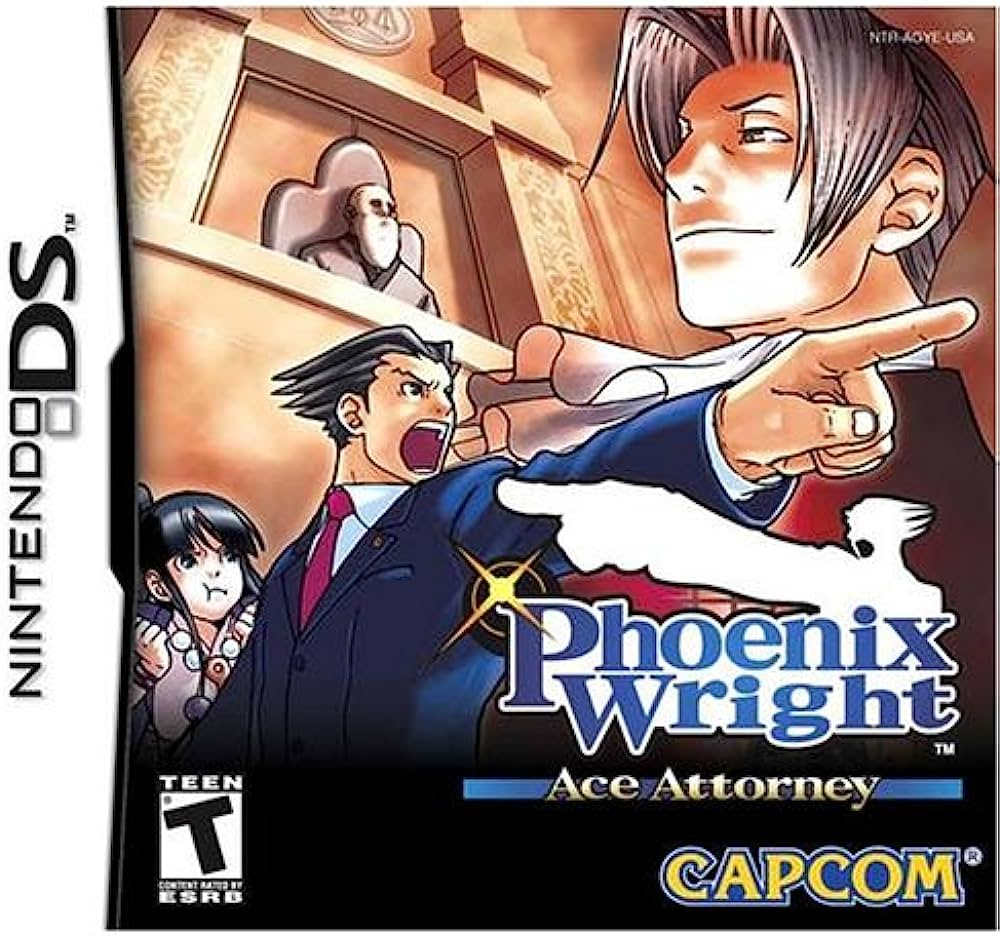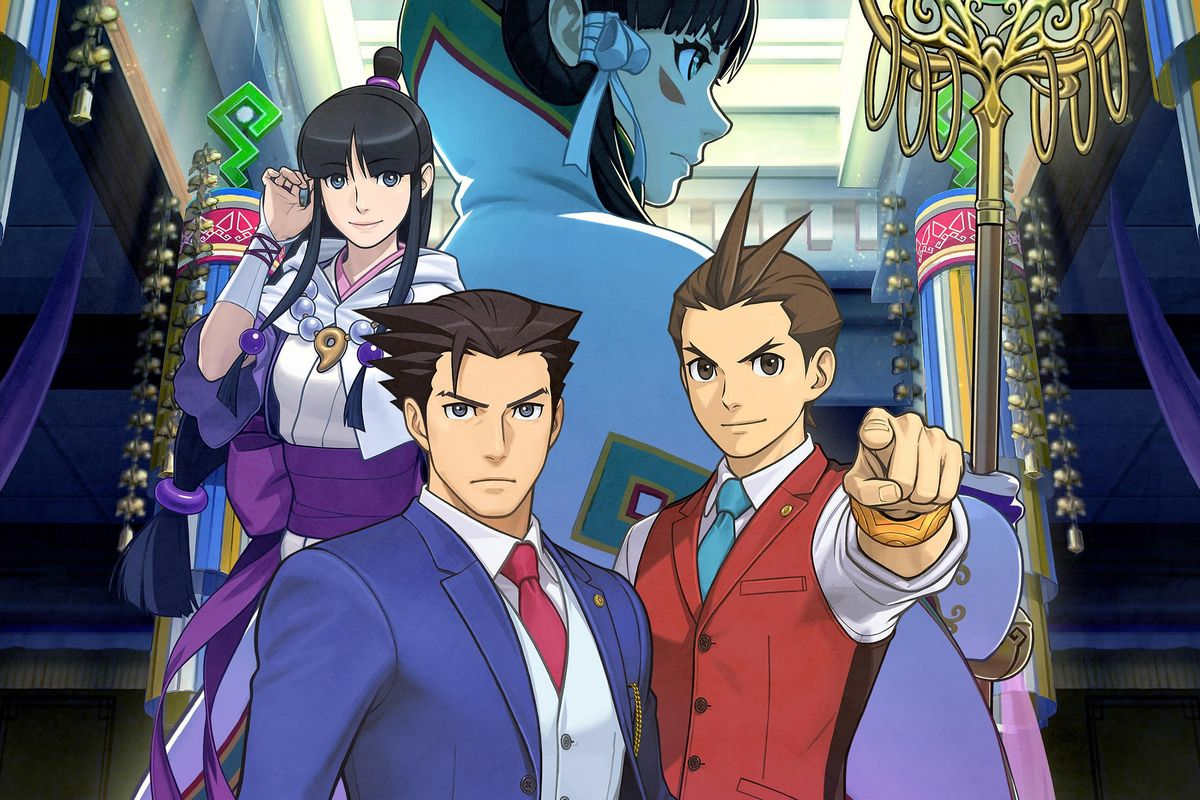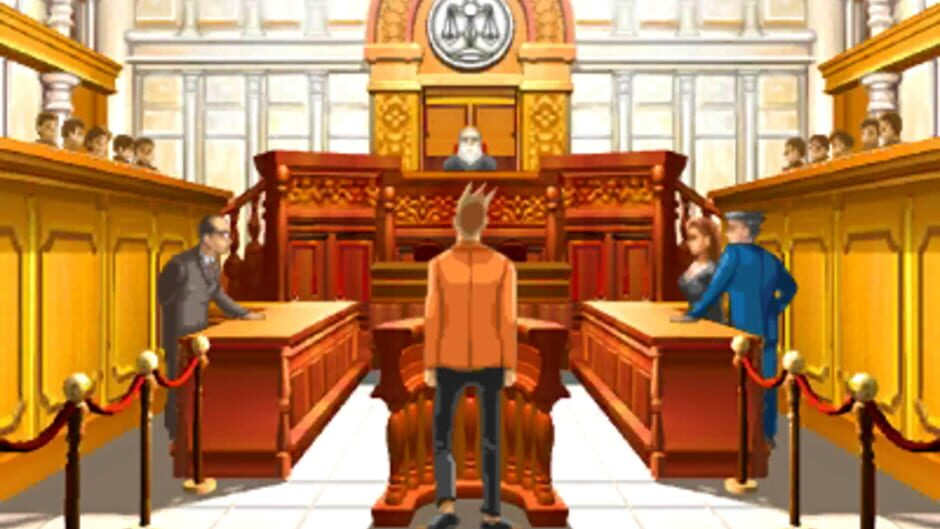The video game industry has been growing exponentially over the years, with developers coming up with innovative and unique concepts to keep their players engaged. One such concept that has captured the attention of gamers worldwide is the “visual novel” genre, which combines storytelling and gameplay to create an immersive experience for players. Amongst these visual novels is “Phoenix Wright: Ace Attorney,” a game that puts players in the shoes of a defense attorney as they navigate through complex cases filled with twists and turns.
Developed by Capcom, Phoenix Wright: Ace Attorney was first released in Japan in 2001 for Game Boy Advance before being ported to Nintendo DS worldwide between 2005-2008. The game‘s success led to several sequels, spin-offs, anime adaptations, manga comics and even live-action movies.
In this article we will explore the various elements that make Phoenix Wright: Ace Attorney one of best visual novel games ever made. We will delve into its unique gameplay mechanics like cross-examination where players are given prompts on what evidence or testimony they could use at certain points during every trial. Additionally, we’ll look at how characters are fleshed out through engaging dialogue sequences featuring bright colours and quirky sound effects which help break down legal jargon so it can be understood regardless your age or education level!
Overall we will examine why Phoenix Wright: Ace Attorney remains popular amongst both casual gamers and professional critics alike even after two decades since its inception – analysing its narrative structure , character development and successful integration of interactive storytelling within a legal setting!
- The game mechanics and narrative structure of Phoenix Wright: Ace Attorney
- Exploring the psychology behind the characters in Phoenix Wright: Ace Attorney
- Analyzing the legal accuracy of trials in Phoenix Wright: Ace Attorney compared to real-life court proceedings
- Examining the influence of Japanese culture and law on Phoenix Wright: Ace Attorney’s gameplay and storylines
- A retrospective look at how Phoenix Wright: Ace Attorney has impacted visual novel games and storytelling within video games
- The role of music in setting tone, atmosphere, and emotion within Phoenix Wright: Ace Attorney’s gameplay experience
- Discussing the localization process for bringing a Japanese game like Phoenix Wright: Ace Attorney to Western markets while maintaining cultural authenticity
- An analysis of fan theories surrounding unsolved mysteries or plot holes within various installments from the franchise such as “Who is Godot?” Or “What happened to Maya Fey?”
The game mechanics and narrative structure of Phoenix Wright: Ace Attorney
At its core, the gameplay revolves around investigation segments where players gather evidence and courtroom trials where they use that evidence to cross-examine witnesses and ultimately prove their client’s innocence.
The game mechanics of Phoenix Wright: Ace Attorney are designed to engage players in critical thinking challenges. Players must analyze crime scenes for clues, interview witnesses, and piece together information from the trial proceedings. The player’s success depends on how well they can identify contradictions in witness testimonies by presenting relevant evidence at key moments during cross-examination.
Narratively, Phoenix Wright: Ace Attorney follows a formulaic episodic story structure with each episode or case featuring unique characters with intricate backstories and motives. These stories follow the traditional three-act structure consisting of setup, conflict, culmination – leading up to intense court battles between prosecution and defense attorneys. Through skillful pacing of these elements throughout each episode, the narrative keeps players engaged while also revealing new plot twists along the way.
Overall, Phoenix Wright: Ace Attorney delivers an engaging mix of game mechanics and narrative storytelling that has won over fans worldwide as it invites them into a world filled with exciting mysteries waiting to be solved by their legal prowess!
Exploring the psychology behind the characters in Phoenix Wright: Ace Attorney
The game offers an interesting perspective on how people react to situations involving crime, guilt, innocence and justice.
One of the core pillars in this game is exploring human behaviour and understanding what drives people’s actions. This includes examining their past experiences, beliefs, values and emotions. For example, Phoenix Wright himself is driven by his strong sense of justice which compels him to defend even those who are guilty or unpopular.
Furthermore, each character in Phoenix Wright: Ace Attorney has their own unique backstory which helps explain why they behave a certain way. Through carefully crafted dialogue and subtle clues we can begin to unravel each character’s motivations – whether it be greed or fear – ultimately leading us towards solving each case.
Overall, Phoenix Wright: Ace Attorney presents players with an opportunity to delve into intriguing psychological concepts such as cognitive dissonance (where individuals hold two conflicting beliefs) when examining witness statements; objectivity versus subjectivity when considering evidence; and empathy when interacting with different clients. It truly provides a fascinating insight into the complexity of human behaviour within the context of law enforcement.
Analyzing the legal accuracy of trials in Phoenix Wright: Ace Attorney compared to real-life court proceedings

The game presents various legal scenarios where players have to solve cases by finding evidence, cross-examining witnesses and presenting their arguments in front of a judge. While the game provides an engaging experience for gamers, it often deviates from real-life court proceedings.
One of the key differences between Phoenix Wright: Ace Attorney and real-life court proceedings is how evidence is presented. In the game, characters often present outrageous pieces of evidence that would never be allowed in a courtroom. Furthermore, objections are sometimes raised without proper grounds or explanation which does not happen in real-life trials where attorneys must follow formal procedures when raising objections.
Another issue with Phoenix Wright: Ace Attorney is how quickly cases move along compared to reality. In-game trials can last mere hours while most real-world criminal trials take several days if not weeks or months before they conclude.
Overall, while Phoenix Wright: Ace Attorney offers an entertaining depiction of legal proceedings complete with eccentric characters and high-stakes drama, it does not always accurately reflect what happens inside a courtroom during actual trials.
Examining the influence of Japanese culture and law on Phoenix Wright: Ace Attorney’s gameplay and storylines
The influence of Japanese culture and law on the gameplay and storyline cannot be understated. For example, the concept of “Gyakuten Saiban” (Turnabout Trial) which is central to the game’s mechanics, draws upon Japan’s adversarial legal system where evidence presented by both sides must be scrutinized before a verdict can be reached.
Moreover, Phoenix Wright also incorporates certain cultural elements unique to Japan such as using honorifics when addressing people, bowing as a sign of respect or apology and even incorporating traditional Japanese attire into character designs. These aspects not only add an authentic feel to the game but also provide insight into Japanese customs and traditions for non-Japanese players.
Furthermore, themes such as corruption within the legal system are explored in Phoenix Wright through its depiction of attorneys manipulating evidence or bribing witnesses – issues that have real-life implications for Japan today. Through exploring these issues within its storylines and characters while staying true to Japanese culture and law, Phoenix Wright has become more than just a simple video game but rather an interactive means of understanding another country’s history and systems.
A retrospective look at how Phoenix Wright: Ace Attorney has impacted visual novel games and storytelling within video games
It introduced a new form of interactive narrative that blends puzzle-solving, legal drama, and character-driven plotlines. The game’s unique gameplay mechanics have become iconic for their blend of courtroom battles coupled with investigations outside the court.
The success of Phoenix Wright: Ace Attorney paved way for more games in the same vein to make it into mainstream gaming culture, such as Danganronpa and Zero Escape series. This established visual-novel-style games as commercially viable products in Western markets where these types of titles were previously considered niche or obscure.

Furthermore, Phoenix Wright: Ace Attorney demonstrated how video games could serve as an avenue for exploring complex themes like morality, justice system failures and social issues. Its characters are well-developed through meaningful dialogue choices which allows players to immerse themselves in their world view.
In conclusion, Phoenix Wright: Ace Attorney’s influence cannot be overstated; its unique approach to blending engaging gameplay mechanics with captivating narratives has inspired countless developers since its inception over two decades ago. Its legacy will continue influencing future generations of gamers who seek deep immersion into both story-driven experiences and challenging gameplay elements alike.

The role of music in setting tone, atmosphere, and emotion within Phoenix Wright: Ace Attorney’s gameplay experience
The game’s soundtrack is composed specifically for each case, with unique tracks assigned to different characters and situations. This approach helps to deepen the emotional impact of the story by capturing the mood of each scene perfectly.
The music cues used throughout Phoenix Wright: Ace Attorney are instrumental in creating a sense of tension and anticipation during courtroom scenes. For example, when evidence is presented that challenges your arguments or witness testimony becomes unreliable, sudden shifts in the score signal a shift in direction or strategy as you work to counter such developments. Similarly, when presenting conclusive evidence that leads to key plot revelations, an upbeat tempo signals both victory for the player and closure for the storyline.
In addition to its use during courtroom proceedings, musical scores also play an important role outside these structured interactions between lawyer and prosecutor. Outside court scenes where players gather clues or interact with other characters often feature ambient background tunes tailored specifically for those settings based on their tone – be it playful banter among friends or somber reflection over a crime scene investigation gone awry – this enhances immersion by making sure every moment feels like genuine part of an ongoing drama being played out before our very eyes!

Discussing the localization process for bringing a Japanese game like Phoenix Wright: Ace Attorney to Western markets while maintaining cultural authenticity
It requires a deep understanding of both the source and target cultures, as well as an appreciation for the nuances that make each unique. One of the key challenges in this localization process is preserving the original intent and message of the game, while adapting it to appeal to a Western audience.
One way to achieve this balance is through careful translation and adaptation of dialogue, taking care to preserve tone, humor, and cultural references where possible. Additionally, attention must be paid to visual elements such as character design and settings – these can provide important cues about cultural context that may not be immediately obvious or easily translatable into another language.
Another crucial aspect of successful localization is working closely with native speakers from both cultures throughout every stage of development. This includes playtesting by members of both cultures, gathering feedback from focus groups and online communities, and consulting with experts on regional differences in language use, social norms, and legal systems.
Ultimately though challenging it may be at times due to linguistic barriers or other issues – successfully bringing games like Phoenix Wright: Ace Attorney across borders means carefully balancing creative expression with respect for cultural traditions – creating an experience that stays true to its origins while still resonating deeply with audiences around the world.
An analysis of fan theories surrounding unsolved mysteries or plot holes within various installments from the franchise such as “Who is Godot?” Or “What happened to Maya Fey?”
With its intriguing storyline, complex characters, and challenging puzzles, the game has left fans with several unanswered questions and unresolved plot holes.
One of the most discussed unsolved mysteries in Phoenix Wright: Ace Attorney revolves around the character of Godot. Fans have been trying to uncover his true identity for years, speculating that he might be someone from Phoenix’s past or even an entirely new character altogether. Some theories suggest that Godot could be related to Mia Fey since he shares similar physical features as her lover Diego Armando. Others speculate that he may have some connection to Dahlia Hawthorne due to their shared love for coffee.
Another major debate among fans is what happened to Maya Fey after she disappeared during Trials and Tribulations. While it is revealed later on in the series that she was kidnapped by a group called “Hazakura Temple,” many fans still question why they took her in the first place and what they did with her while she was missing.
Overall, these fan theories provide fascinating insights into how dedicated gamers can delve deeper into intricate storylines filled with complex characters and plot twists. As more installments are released within this franchise, it will be interesting to see which of these fan theories turn out to be correct or if there are any other unsolved mysteries yet unknown awaiting discovery by fans eager for answers!
In conclusion, the game Phoenix Wright: Ace Attorney is a masterful work of storytelling and gameplay. Its unique blend of detective work and legal drama provides players with an immersive experience that challenges their intellect and problem-solving skills.
The game’s well-crafted characters are richly developed through dialogue, creating emotional connections between them and the player while also providing important clues to solving cases. The use of evidence gathering, investigation, cross-examination, and courtroom theatrics makes for engaging gameplay that keeps players on edge until the very end.
Moreover, the game’s artistic direction is exceptional in its use of anime-inspired visuals that help convey personality traits, emotions and add depth to each character. The music score presents exciting court themes as well as atmospheric background music to further enhance this experience.
Phoenix Wright: Ace Attorney has set a new standard for visual novel games with its innovative approach to combining procedural investigations with unpredictable trials where anything can happen at any given time. This game serves not only as entertainment but also as an educational tool in legal studies by illustrating how real-life courts operate in various countries such as Japan or America.
Overall, Phoenix Wright: Ace Attorney is a must-play title for anyone who enjoys crime dramas or puzzle-solving games. It offers entertaining gameplay mechanics combined with immersion into the justice system making it one of Capcoms’ best titles yet!
Read More:- Unravel the Mystery in Professor Layton VS Phoenix Wright Ace Attorney – The Ultimate Game Crossover!.
- Discover the Intense Trials and Tribulations of Phoenix Wright in this Exciting Game!.
- Unleash Your Inner Lawyer with Miami Law Game – Experience the Thrill!.
- Rev Up Your Ride with Trials Evolution: Origin of Pain Game – A Thrilling Adventure! (69 characters).
- Danganronpa 2: Goodbye Despair – A Thrilling Game of Mystery and Betrayal!.
- Master the Court with Mario Tennis: Power Tour – The Ultimate Game for Tennis Enthusiasts!.
- Experience the Thrill of NBA Basketball with ESPN's Top-Notch Game (64 characters).